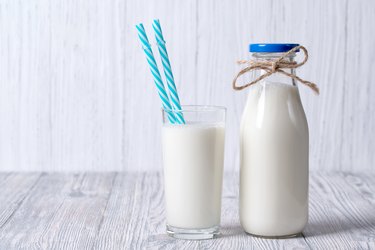
If you're sniffing and sneezing with blocked passages, you might pass on drinking milk for a while. Dairy is widely believed to be top of a list of foods that cause sinus congestion and excess mucus. In reality, however, the link between dairy and sinus issues is by no means clear cut.
Tip
Milk isn’t a major cause of sinus problems. An allergy to dairy or any other food, for that matter, might cause a runny nose. However, there’s nothing specific about milk that makes it mucus-forming.
Video of the Day
Allergy, Dairy and Sinus
Many people think there's a link between an allergy or intolerance to dairy and sinus problems. However, milk allergy and intolerance are different, with distinct symptoms. The Mayo Clinic explains that a milk allergy involves an abnormal response by the immune system, causing rapid-onset symptoms that include wheezing, vomiting, hives and digestive problems — and in the worst-case scenario — anaphylactic shock.
Video of the Day
Runny nose can be a symptom of milk allergy, too, but takes a longer time to develop. If you just have a runny nose in the absence of other symptoms, it's unlikely to be due to a milk allergy. Milk intolerance does not involve an immune system reaction. It is usually due to an inability to digest the milk sugar (lactose) in milk.
Lactose intolerance may be one of the reasons you may feel bloated or have gas or diarrhea, according to the Mayo Clinic, but is unlikely to be a cause of sinus problems. In a nutshell, the milk allergy sinus link isn't very strong. Furthermore, neither milk allergy nor intolerance is inextricably linked with congested sinuses, as many people think.
Read more: How Is Lactose-Free Milk Made?
Milk and Mucus
Many people believe milk causes causes extra mucus production, but research doesn't support this. A classic study published in the February 1993 issue of the journal Appetite gave identical-tasting flavored dairy milk and soy alternative to trial participants who had been told the purpose was to measure the "milk mucus effect" and did not realize that some of the drinks were not dairy-based.
Participants in the trial reported effects such as having a coating in their mouth and having thicker saliva. The rub? There was no difference between numbers of people who reported this with cow's milk versus soy milk.
Foods That Cause Sinus Inflammation
If milk isn't really an issue, are there other foods that cause sinus congestion or specific foods to avoid for sinusitis migraine perhaps? Not directly, but the Mayo Clinic says spicy foods and alcohol are triggers for nonallergic rhinitis (symptoms of which include stuffy nose and phlegm). Such reactions can occasionally lead to sinusitis (inflammation or infection of the membrane that lines the sinuses).
If you have sinusitis, it might pay to eat more foods with a dampening effect on inflammation in the body. Harvard Health says these include tomatoes, olive oil, leafy greens, nuts and oily fish and not too many fatty or sugary foods. A study published in the January 2016 issue of Thrombosis and Hemostasis specifically identified plant foods rich in polyphenols associated with low-grade inflammation. Polyphenol-rich foods include blueberries, apples and kale.
A study featured in the October 2017 issued of PLOS One suggested that keeping up intake of vitamin D could be important to combat sinus issues, too. The experiment used animal subjects, so the results should be interpreted with caution. It showed that dietary vitamin D deficiency exacerbated inflammation in the animals' nasal and sinus passages.
- Mayo Clinic: "Milk Allergy"
- Appetite: "The Milk-Mucus Belief: Sensory Analysis Comparing Cow's Milk and a Soy Placebo"
- Harvard Health: "Foods That Fight Inflammation"
- Thrombosis and Haemostasis: "Polyphenol Intake Is Associated With Low-Grade Inflammation, Using a Novel Data Analysis From The Moli-Sani Study"
- PLOS One: "Dietary Vitamin D3 Deficiency Exacerbates Sinonasal Inflammation and Alters Local 25(OH)D3 Metabolism"
Was this article helpful?
150 Characters Max
0/150
Thank you for sharing!
Thank you for your feedback!